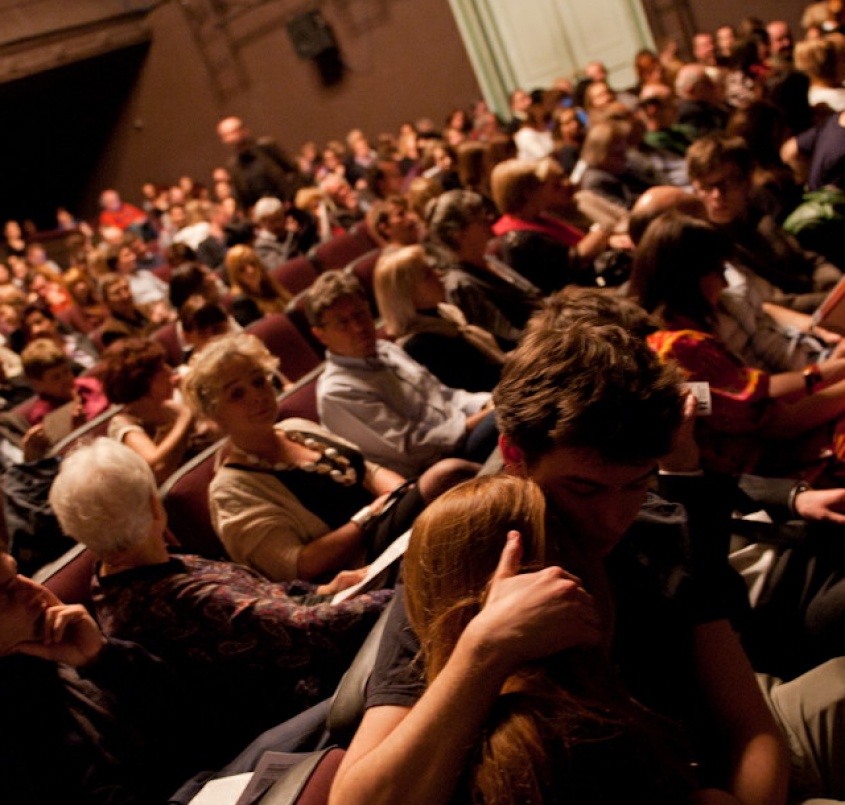Public Theatre

photo by Marta Ankiersztejn
From my childhood I remember my utmost surprise when during holidays in the countryside my mother wrote a letter on behalf of three women, wishing to help them in some matter, and asked them to sign it. The women put three crosses. To me, a child, it seemed virtually impossible that adults could not write.
I saw that my friend lived with his parents in an old cottage, with interior walls black with smoke and a hole in the roof where the chimney should be. We would spend our holidays by a paraffin lamp for the next two years. During the third holidays, we were transferred to a different era, we experienced electrification of the village. I kept my childhood delight in my heart until today as back then I saw many people so enthusiastic to act together so that a leap forward in civilization could take place. I saw many people who felt responsible for others. And there was no ideological compulsion in it. Nowadays, freedom provokes many people to free themselves from such responsibility. It is up to you where you live, it is up to you whether you learn anything, it is up to you whether you are healthy, it is up to you whether you enter theatre any time in your life. You are free. Society? What is that? I keep observing how this freedom changes us. Young people listen to what I said above with disbelief. Today, what is public sounds exotic. Public library, state school lose their foundations among us. And the foundation is shared responsibility for what our country will be like.
History happens as long as we live. Our deeds create it. I am writing the above since I got engaged in a public discussion about the model of Polish theatre. There are countries in Europe where theatre is merely a building. A building for rent for various events. A show can or cannot take place due to objective i.e. financial reasons. A restructuring of the model of theatre inherited from the 19th century was undertaken for instance in the Netherlands, in the name of democratisation of art, liberating it from bourgeois shackles. However, when the global financial crisis hit, artists allied in small, cheap groups lost the ability to turn their visions into reality. In turn the model of German theatre, contested as an art-factory, though subject to many cost-saving restrictions, became a guarantee of the show taking place. Meanwhile in Poland, for some time now, I have been observing attacks on the model inherited from the communism, a network of theatres where opportunities for stable companies and changing repertoire are created. Those who electrified the country came to the conclusion that Poland needed a network of theatres. I think it still holds true. I wonder whether the inspiration to free buildings from companies stem from artists seeking forums of expression and the labour market, or from people who we define as theatre managers. There are some artists who see theatre as a laboratory for the language of artistic expression and they are bothered by the fact that theatre is an eclectic phenomenon and proves itself based on the number of seats taken in the audience. In my opinion, theatre is public when there “are various books in it”. Erwin Axer asked me once: 'You seem to read a lot, but do you also read crime stories?' I was astonished, 'What for?' I asked. 'Well, you definitely should, it will be useful for you when creating stage characters.' Someone who feels responsible for public theatre, financed from public means, cares for different types of audience.
However, nowadays the problem lies in the fact that a proportion of potential audience - due to financial reasons - does not appear in the audience. An argument put forward in this discussion is the price of tickets in commercial theatres and a full house there. Who, however, wishes to be responsible for others and feels the need to impact the imagination of one's countrymen, cannot succumb to such arguments. Government / local authorities need to remain open and generous towards theatres, so that theatre can be a public good, thus broadly available.
Thanks to the experiment of Wojciech Bogusławski, who transferred his bankrupting National Theatre to the Government Commission, we can now refer to his belief that the beauty of theatre entails a power uniting our community enlightenment. Internal enlightenment. To be able to experience it one has to train one's own mind and sensitivity, for instance by continuous reinterpretation. Those who feel responsible for the community must impose themselves on free fellow citizens. It is worth investing in the ability to enjoy theatre already at school age. In the state school one should learn to make use of public theatre. Let politicians be like those who wanted to electrify the country in the times of my childhood, let them not be like the present representatives of companies selling energy, since theatre has a purpose. Let it brighten, like the torch of learning once did, the darkness of our riddle that will not be solved by any generation.
Today, theatre is a niche phenomenon, not because it lost its audience but because its audience is smaller than that of TV. Because of its specificity of a unique encounter, when one sees the performance and one is seen, the theatre is public. It is an event that is public and very intimate at the same time.
Olgierd Łukaszewicz
President the General Board of the Association of Polish Stage Artists (ZASP)